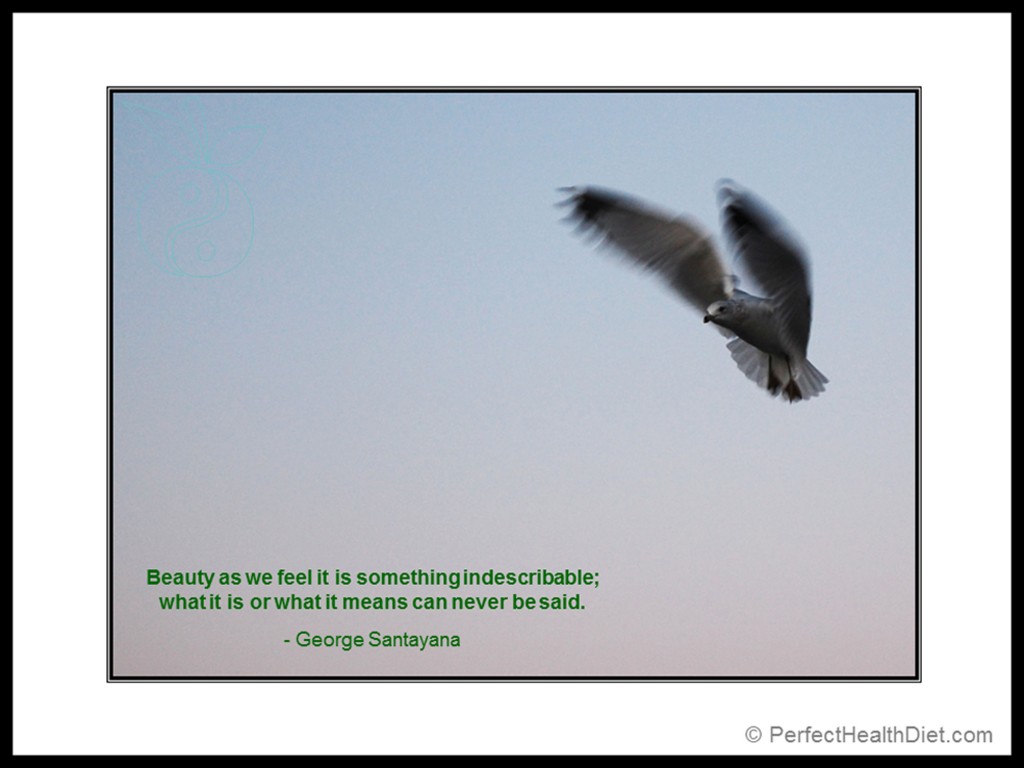The Audible edition of our book will be released tomorrow, Monday, March 25. Also, early buyers of our Kindle edition received email notice from Amazon last week of a major update: this fixes the links to notes.
This week I’ll be at PaleoFX and posting will be light. There are still a few tickets available, so if you can make it to Austin, please do!
Also, the 2013 Ancestral Health Symposium is accepting registrations. Only a limited number of rooms at the Sheraton are available at the event rate, so please consider making plans now.
[1] Music to read by: I feel a sermon coming on …
We try to follow Johnny Mercer’s prescription. The attitude of doing right is:
- Look for goodness in others and encourage it; overlook faults.
- Ac-cent-tchu-ate the positive, eliminate the negative.
Robert Louis Stevenson, too, had a good attitude:
- “There is no duty we so much underrate as the duty of being happy. By being happy we sow anonymous benefits upon the world.”
- “Our business in life is not to succeed, but to continue to fail in good spirits.”
So let us be happy, and seek good health in good spirits!
[2] Reader results: There is much to celebrate.
Hillary reports that PHD has been life-changing:
Life changing in that it’s the first “diet” I can see being a long term lifestyle, I’ve already lost ten pounds without trying and for once I’m eating healthy because I want to be healthy, not because I want to lose weight (although that’s been a great benefit). It’s much easier to stick with something because it makes your body feel good, not for the fad of it. I’ve got my husband on it as well. We’re eating things we never thought about making before – I’ve recently made goat and oxtail stews, which was a first. I don’t crave sugar anymore, which is amazing and I love that I can still eat chocolate daily (I have a square of 90% topped with a date to sweeten it up) and a glass of wine.
Elizabeth Perez had an epiphany:
I can still remember that first night I had a PHD homecooked meal. I had been fat phobic and eating brown rice and whole wheat bread and the very first time I heard Dr Mercola and Jaminet talk I got some fatty beef with carrots celery and onions in my crockpot and 8 hours later around 11pm had my first home made stew with white rice and avocado and I felt this indescribable nourishing just ‘right’ feeling in my gut and body and that night I slept like a baby. That interview just made so much common sense and left me with this gut feeling like ‘I just knew’ it was true and got ‘permission’ to enjoy a fatty meal. Something in me ‘remembered’ all Jaminet was saying. Weird right? But anyway it was the interview and meal that changed my life forever. Lol.
Claire reports a cure of her IBS:
Hi Paul!
I recently started taking N-acetylcysteine after reading your blog posts about IBS and bowel disease. For the past two years I’ve been in pain, had irregular bowel movements, basically everything that goes with IBS. However, after starting NAC, I HAVE NO MORE IBS AT ALL!!!!!!!!!!!!!!
THANK YOU! THANK YOU! THANK YOU!
I’m stunned. I was hoping to understand why on earth this has helped so greatly? I don’t understand what it “fixed?”
The PHD book and this blog have literally saved my health and my sanity. I am eternally grateful.
Libba writes:
I have been faithfully sticking to PHD for one month and have seen drastic improvement! I am so grateful to you and your wife for the work and knowledge you have shared. I have 40 stubborn pounds to lose, scalp psoriasis, acne and other random ailments. I’m down 9 lbs, have more energy than I can remember and my scalp and skin have never looked better (if I do say so myself)!
Long-time commenter Mari writes:
Thank you, Paul, for PHD.
When I first started following the PHD diet and lifestyle recommendations two years ago, I wrote up a list of the various issues that were bothering me: frequent blackouts, cold extremities, digestive issues, hair loss, chronic sinus infections, extremely low blood pressure, low blood sugar, no sensation of hunger, migraines, muscle weakness, insomnia, etc. Without having to think too hard, I came up with 37 health issues.
On my one year anniversary of adopting PHD, I went over my list and saw that nearly all of those issues were gone. There were some new things that that I became aware of as I worked on tweaking to find what worked best for my body. Still, I had only 2 of my initial health symptoms, and a few new ones.
Now, on my second year anniversary of PHD, I have none(!) of the initial health issues. I have a few things that are new since starting PHD–such as a lot more build-up on my teeth–but I can say that following the PHD template has completely changed my health, energy, and mood. And I’m sure by year three, with some tweaking, these last few things will be scratched off the list.
Carmelite wrote:
I just started your diet last week, have not even completely implemented it yet, and am already seeing amazing benefits to my mood, energy levels, and a reduction in food cravings.
A Chinese emailer wrote:
I find that the PHD diet has worked really well. You are so right; when the nutrients are at an optimal level for peak health, I feel very well, physically and emotionally. I neither overeat nor undereat and just feel like a well oiled machine with lots of energy and my mood is on an even keel.
We’re very interested in pregnancy and nursing anecdotes. Meg reports that PHD is great for generating breast milk:
I have had amazing success on your diet after struggling for years to balance my motherly demands and lose weight. I have been breastfeeding and/or pregnant for almost 6 years, and I found that when following low-fat or low-carb diets while breastfeeding, milk supply will diminish. For years I tried cutting calories, cutting carbs, cutting fat, etc, always with the same result= no milk and a mad baby. I started PHD in December and have lost 15 pounds so far (about 10-15 more to go), I feel great, and I have TONS of milk. And the milk has changed! I can tell because the babies (ages 2 and 10 mos) don’t seem to need to nurse as often, and their bowel movements are much healthier looking. Sorry for TMI, but I know that sharing my experience will help someone else eventually.
Daniel Kitching writes:
I have been on the PHD for nearly three weeks now, and I’m seeing AMAZING results. I feel great, I’m not hungry or craving, and I’m discovering new, delicious foods. I even was able to stick to it while at Walt Disney World. Thanks A MILLION!
Laurie has done better on PHD than on low-carb or high-carb:
I’ve only been following the PHD for a less than a week, so I’m still trying to figure out just what works for me. First thing I can say is that I have never felt quite so satisfied and full on any diet as this one. Going 16 hours without eating (except for coffee and cream/coconut oil in the morning) has been an absolute breeze.
I feel full and satisfied after each meal, and that feeling sticks around for a long long time! I thought carbs made me hungry. Turns out it was wheat that gave me the cravings. I’m fine with potatoes and rice! Better than fine, really! I’m amazed at how great I feel!
I’m a person who has always struggled with hunger. I’m just not good at white knuckling through it! I thought I had hit the jackpot when I found low carb. Eating low carb was the closest I had ever come to actually controlling my appetite. Sadly, I didn’t keep it up forever, and gained all my weight back, plus some.
So did Caressa Santella Neary:
Dear Paul and Shou-Ching, I just had to tell you both how much I love the new edition of your book! I have been on a low carb and high fat diet for many years and my weight loss had stalled and my energy levels were terrible. I added some safe starches and cut back on added fat on my foods and am happy to report your approach has restarted my weight loss and improved my energy levels and mood, very excited!
Lynh writes:
My things which resolved:
1) No more cold/canker sores.
2) more energy! and a better mood.
3) I feel satiated with the rice, potatoes, or sweet potatoes
4) finally – a more normal body temperature! this has been the best part, I used to feel cold all the time and supplementing with iodine and selenium, diet, etc., my body temperature went from 97 to 98.2. I don’t need a coat anymore when it’s cold outside and I used to be freezing all the time.
I really like the explanations for everything in this book, I wish it were required reading for medical school students.
Tim Freeman tweeted:
Dropped 20 pounds in 28 days with PHD. No hunger, better mood, and better sleep.
David wrote:
Oh yes, things have definitely gotten better with PHD. I came from a gluten-free standard american diet (GFSAD ), eating out 3 times a day. I was already off gluten for two and a half years before PHD, but transitioned quickly and almost live in the kitchen now. I’ve lost over 40 pounds since starting PHD and have maintained it easily for quite a while now. Thank you guys so much for your work. Glad I found it first before going on to read books on Paleo and Primal. I’m just about finished with the 2nd edition of PHD, awesome work.
Our thanks to everyone who shares their results or writes Amazon reviews! We’re most grateful.
[3] Cute animals:
Via Yves Smith.
Bonus: A new breed of chauffeur:
[4] Interesting items:
The English of the mid-1800s had a life expectancy at age 5 similar to ours, despite a far higher incidence of infectious disease; credit belongs to their healthy diets and lifestyles. This finding is more evidence that diet and lifestyle can substantially reduce risk of cardiovascular disease and cancer.
Miki Ben-Dor reviewed Marlene Zuk’s Paleofantasy and Christina Warinner’s TEDx talk that I mentioned positively last week. He thinks her anthropology is wrong, and suspects her of anti-meatism.
Sally Fallon critiques Paleo.
Neely Quinn points out that if you’re craving carbs, you just might need carbs. Women’s Health Mag has further tips on what food cravings may mean (via Craig Newmark).
Seth Roberts believes in earwax transplants for ear infections.
The Atlantic looks into why published research misleads us.
Emily Deans reports that early-life malnourishment affects adult personality traits.
Via Connie Warner, “Let them eat fat.”
Another reason to avoid multivitamins: Via ProfDrAndro, manganese increases the virulence of the Lyme disease pathogen Borrelia and presumably other pathogens too.
Keeping track of Paleo parodists: Hunter Gavera, who authored this Paleo manifesto, might be the same person as MatthewGreenUK who assembled this video and as Walter West, Paleo Caveman. He might be a different person than Paleo Dooche,. Via Meredith Harbour Yetter.
Sarah the Healthy Home Economist shows that food reward really does promote acquisition of the healthiest foods – even in thieves!
Maybe a rice diet isn’t so great for chickens.
[5] Never lose hope: I didn’t know this: In his 30s, Alexander Solzhenitsyn was diagnosed with a late-stage malignant cancer and was not expected to live, but after converting to Christianity staged a recovery he regarded as miraculous.
He went on to win the Nobel Prize for Literature and to chronicle the evil of Soviet prison camps. One of his best passages:
If only there were evil people somewhere insidiously committing evil deeds, and it were necessary only to separate them from the rest of us and destroy them. But the line dividing good and evil cuts through the heart of every human being. And who is willing to destroy a piece of his own heart?
[6] Not the weekly video: What an inspiration!
[7] Shou-Ching’s Photo Art:
[8] Weekly Video:
Will Harris is a zero-waste farmer, is pioneering zero-waste natural cattle raising at White Oak Pastures. Watch this terrific video (via PrimalDocs):




















Recent Comments